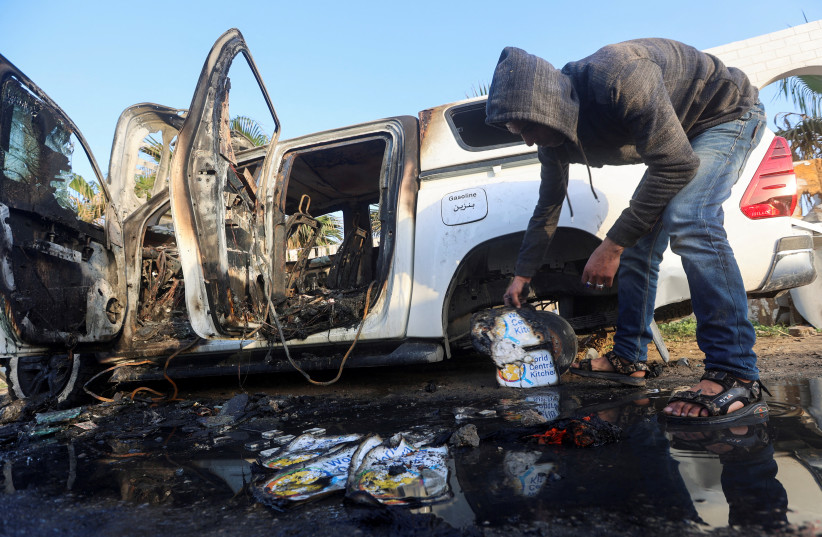The IDF dismissed two senior IDF officers and censured three others – including OC Southern Command Maj. Gen. Yaron Finkleman and Nahal Brigade Commander Col. Nochi Mendel – on Friday as it explained the series of errors that led it to mistakenly kill seven World Central Kitchens aid workers on Monday.
According to the IDF, there were seven different action points in the incident.
The drone unit saw multiple suspicious actions, starting after 10 p.m. Monday.
First, the drone unit said it saw a Hamas terrorist climb onto one of the trucks and fire in the air at what it called action point two.
According to the IDF, this tactic is frequent and is used by Hamas to send signals to other Hamas fighters in the area regarding his position.

At action point three, the convoy split up.
At action point four, the convoy entered a hangar, which obscured which vehicles might be going in and out and who might be in the vehicles compared to who was in the vehicles before entering the hangar.
IDF unable to reach aid workers
In the first four action points, the IDF drone unit refrained from attacking the aid trucks, because they questioned their commanders and were ordered by Division 162 Brig. Gen. Itzik Cohen not to, despite a suspicion of Hamas terrorists being involved. IDF tried to call aid workers, was unable to reach them.
At the fifth action point, the aid trucks had left the hangar.
As the events developed, the IDF tried to call the aid workers involved in the field and was unable to reach them.
Next, the IDF called the WCK headquarters. The WCK headquarters tried to call its own aid workers in the field, but they did not answer.
When vehicles left the hangar, the IDF drone unit believed that these were not the same vehicles and thought that these were Hamas vehicles or that around four Hamas operatives had joined or taken over the convoy.
According to the IDF, attacking the trucks after all of this was a mistaken identity issue but could not lead to criminal charges.
Accordingly, the drone unit believed the order not to attack no longer applied.
Around a kilometer later, around 11:09 p.m., the drone unit believed it had the right to engage the trucks.
Also, the drone unit had thermal imaging that did not see the WCK aid worker sign posted on the roof of the trucks.
When the drone unit attacked three separate times in succession, it believed that the “coast was clear” completely to attack what it thought were clearly Hamas targets.
Colonel and Major involved in attack were fired
The IDF said that even though this could not be a criminal issue, Nahal Brigade Commander Col. Nochi Mendel and a major involved in the attack were being fired from their positions as they still could have refrained from attacking based on a general worry that there could still have been aid workers in the vicinity.
Likewise, Col. (res.) Yair Zukerman, Cohen, and their commanding officer, OC Southern Command Maj. Gen. Yaron Finkleman, were censured for not having standing orders, which would have infused even greater restraint within their troops.
Further, the IDF said that only an attack on the first truck could be somewhat more justified because only there had the drones positively identified Hamas terrorists, whereas the suspicions about Hamas terrorists in the second and third trucks were based more on conjecture regarding the character of the trucks themselves, or a weaker identification of possible terrorists, and without those possible terrorists even confirmed as being armed or presenting an imminent danger.
Regarding identifying the trucks themselves, the IDF said that a source of complexity was the Toyota pickup trucks involved, which are usually a characteristic of Hamas and were not typically used by the aid workers.
The IDF was uncertain about what happened to any of the Hamas terrorists who might have weaved in or out of the incident.
In the future, the IDF said it would place a sticker on the vehicles, which could be seen by drone units even at night.
The IDF said it had presented the findings to the WCK and was still answering questions, and it was not sure how the organization would respond.
Following the incident, the WCK suspended all operations in the Gaza Strip and appeared to be leaning toward permanently ending all operations.
The WCK responded to the preliminary investigation on Friday afternoon, calling the disciplinary action taken and the commitment to reforms “important steps forward.”
The organization stressed, however, that “it is also clear from their preliminary investigation that the IDF has deployed deadly force without regard to its own protocols, chain of command, and rules of engagement.
“Without systemic change, there will be more military failures, more apologies, and more grieving families,” said the WCK, adding that the “root cause of the unjustified rocket fire on our convoy is the severe lack of food in Gaza.”
The WCK demanded the establishment of an independent commission to investigate the strike in which the aid workers were killed.
“The IDF cannot credibly investigate its own failure in Gaza,” said the WCK.
